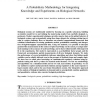Free Online Productivity Tools
i2Speak
i2Symbol
i2OCR
iTex2Img
iWeb2Print
iWeb2Shot
i2Type
iPdf2Split
iPdf2Merge
i2Bopomofo
i2Arabic
i2Style
i2Image
i2PDF
iLatex2Rtf
Sci2ools
JCB
2006
2006
A Probabilistic Methodology for Integrating Knowledge and Experiments on Biological Networks
Biological systems are traditionally studied by focusing on a specific subsystem, building an intuitive model for it, and refining the model using results from carefully designed experiments. Modern experimental techniques provide massive data on the global behavior of biological systems, and systematically using these large datasets for refining existing knowledge is a major challenge. Here we introduce an extended computational framework that combines formalization of existing qualitative models, probabilistic modeling, and integration of high-throughput experimental data. Using our methods, it is possible to interpret genomewide measurements in the context of prior knowledge on the system, to assign statistical meaning to the accuracy of such knowledge, and to learn refined models with improved fit to the experiments. Our model is represented as a probabilistic factor graph, and the framework accommodates partial measurements of diverse biological elements. We study the performance...
| Added | 13 Dec 2010 |
| Updated | 13 Dec 2010 |
| Type | Journal |
| Year | 2006 |
| Where | JCB |
| Authors | Irit Gat-Viks, Amos Tanay, Daniela Raijman, Ron Shamir |
Comments (0)

